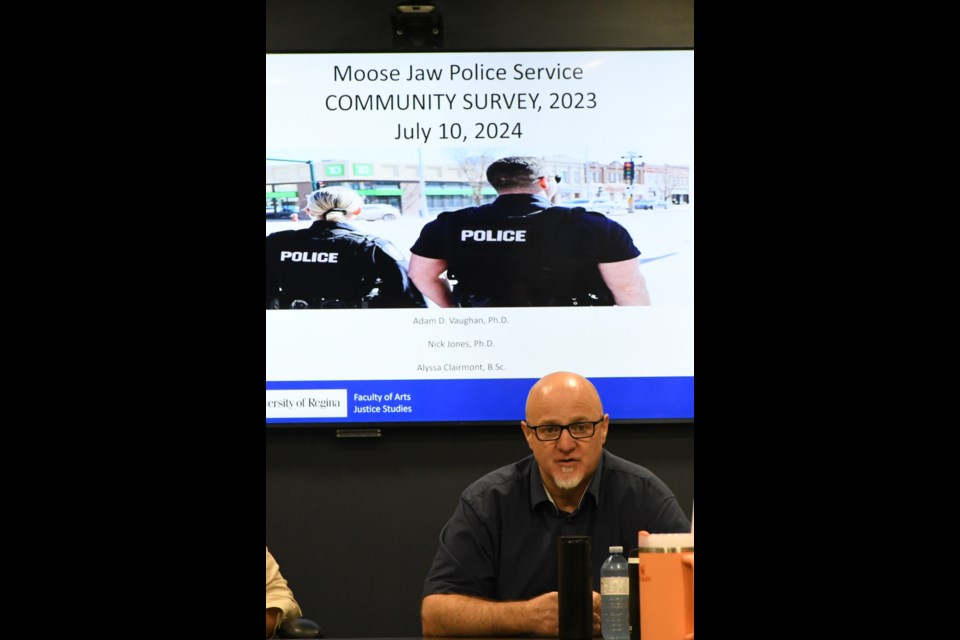A new survey shows that over three-quarters of residents are satisfied with the level of service the Moose Jaw Police Service (MJPS) provides, which is a slight decrease from a similar questionnaire in 2019.
The University of Regina’s Department of Justice Studies conducted a community perceptions survey last fall. Researchers contacted 327 residents and asked them more than 40 questions about the MJPS.
Based on the 2021 Statistics Canada census, that number represented about 10 percent of the population, and it was considered a suitable sample size that could be projected onto the general population.
Dr. Nicholas Jones presented the survey’s findings during the July 10 board of police commissioners’ meeting and pointed out that there was a “modest overall decrease” in the general perceptions of the MJPS, which was due to national and international events occurring around 2021.
Specifically, every major public institution — including police agencies — “took a real hit” in popularity beginning in 2020 because of situations like the coronavirus pandemic and the George Floyd incident.
While public perceptions of police have rebounded in some locations, in others, the public ratings have not returned to pre-pandemic levels and may never do so, Jones said. The department would have conducted a new survey for the MJPS in 2021 but advised the agency that it wasn’t a good time to pursue it.
Jones added that “in hindsight, it was unfortunate” that the university didn’t conduct a survey then because while it would have shown a major decrease from 2019, there would have been a significant rebound two years later.
Survey results
The survey results showed:
- 72.4 per cent agreed or strongly agreed that officers are visible; that number was the same in 2019
- 79.4 per cent agreed or strongly agreed that that visibility remained constant from 2022 to 2023; the response in 2019 was 81.5 per cent
- 77.7 per cent agreed or strongly agreed that the agency demonstrates professionalism; that number was 82.4 per cent in 2019
- 78 per cent agreed or strongly agreed that the MJPS has integrity and honesty; this number was 85.3 per cent in 2019
- 83.6 per cent agreed or strongly agreed that they had trust and confidence in calling 911; the response in 2019 was 87.8 per cent
- 71.8 per cent agreed or strongly agreed that officers understand the community’s issues; that number was 71.9 per cent in 2019
- 74.3 per cent said the overall quality of service the MJPS provided was very good or excellent, compared to 81.9 per cent in 2019.
- 76 per cent of respondents ranked their overall satisfaction with the MJPS as satisfied or very satisfied; that number was 81.3 per cent in 2019
Meanwhile, respondents’ top three policing priorities were reducing organized/gang-related crimes like drug trafficking, reducing property crime, and addressing impaired driving. In comparison, the second and third priorities were reversed in 2019.
Also, 66.3 per cent of people said they would pay an extra $2 per month in taxes to help the MJPS confront these challenges. This was slightly lower than in 2019.
Contact with police
Meanwhile, 38.9 per cent of residents had contact with police last year, compared to 43.5 per cent in 2019, the report showed. Of note, residents over 55 had more contact than younger people, while those who have lived here less than 30 years reported more contact with members.
Also, 54.8 per cent initiated contact with police last year compared to 60 per cent in 2019.
Victimization
The survey found that 73.7 per cent of respondents — 241 people — had never been a victim in the past two years, while 16.2 per cent were victims and reported their situations to police while 7.3 per cent of victims never called police.
The main reasons people didn’t report were that they didn’t consider it important (34.3 per cent), lacked confidence in police (28.6 per cent), or thought the property had minor value (20 per cent).
Meanwhile, 56 per cent of people thought the police response was either very good or excellent, compared to 64.7 per cent five years ago.
Also, 32.8 per cent of respondents called 911 or police in 2023 — older adults called more than younger people — and 74.1 per cent reported positively that they received “sufficient information” from the agency. In comparison, in 2019, those numbers were 35.4 per cent and roughly 80 per cent.
Crime and fear
Residents’ perceptions of safety in their communities have decreased across Canada since 2019, especially after the lockdowns occurred, Jones said.
In Moose Jaw, 55.1 per cent of respondents said the community was safe or very safe, with 1.8 per cent saying it was very unsafe. In 2019, those numbers were 59.7 per cent and 2.5 per cent, respectively.
However, 46.3 per cent of people said crime had increased in their neighbourhood throughout 2023, which was a 4.2-per-cent increase over 2019. Also, 52.1 per cent said crime had stayed the same, compared to 54.3 per cent in 2019.
Nearly 70 per cent of respondents reported feeling reasonably safe or very safe walking along in their neighbourhoods at night, compared to 69.4 per cent in 2019. However, 6.8 per cent said they felt very unsafe, compared to 5.9 per cent five years ago.
Furthermore, 22.6 per cent said crime prevented them from doing things they liked to do, a jump of three per cent from 2019.
The next police board meeting is Thursday, Aug. 8.




